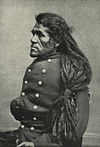Amber Larson, Dhr. Seven, Crystal Quintero, Pat Macpherson, Seth Auberon, Wisdom Quarterly; Maurice O'Connell Walshe (trans., accesstoinsight.org); Time.com; Popfotos.com
 |
| Congregation awaits sharpening their spears as a ship looms in the distance (Survival Int'l). |
.
Ancient island-dwellers kill to keep others awayJuly 17, 2015 (Spooky, Strange)
Our local Neighborhood Watch has nothing on these people -- who will straight kill an outsider if s/he come anywhere near their island. For nearly 60,000 years, an indigenous tribe called the Sentinelese has inhabited this small territory in the Indian Ocean. They are believed to be the most disconnected civilization in modern times, with very little known about their language, their rituals or the island they call home. The Sentinelese people prefer to be left alone, willing to attack anyone who enters their vicinity.
 |
| The only GUIDE you need |
Who are these Sentinelese?
Let us ask the HHGTTG (aka Wikipedia): Sentinelese (also Sentineli, Senteneli, Sentenelese, North Sentinel Islanders) are an indigenous people of the Andaman Islands, in the Bay of Bengal. They inhabit North Sentinel Island, which lies westward off the southern tip of the Great Andaman archipelago. They are noted for resisting attempts at contact by outsiders.
The Sentinelese maintain an essentially hunter-gatherer society subsisting through hunting, fishing, and collecting wild plants. There is no evidence of either agricultural practices or methods of producing fire (B.K. Roy Burman, ed., 1990, Cartography
for development of outlying states and islands of India: short papers
submitted at NATMO Seminar, Calcutta, December 3-6, 1990, National Atlas and Thematic Mapping Organisation, Ministry of Science and Technology, Government of India. p.203).
Their language remains unclassified and is not mutually intelligible with the Jarawa language of their nearest neighbors (Enumeration of Primitive Tribes in A&N Islands: A Challenge,
The first batch could identify 31 Sentinelese. The second batch could count altogether 39 Sentinelese consisting of male and females adults, children and infants. During both the contacts the enumeration team tried to communicate with them through some Jarawa words and gestures, but, Sentinelese could not understand those verbal words). The Sentinelese are designated as a Scheduled Tribe. More
.
 |
| Some who wander are lost. |
Vandals in Philadelphia bring Hitchbot's adventure to an untimely end. A hitchhiking robot eager to explore America has met its demise just two weeks into its cross-country journey.
HitchBOT was vandalized in Philadelphia ["City of Brotherly Love"] overnight on Saturday after
exploring parts of Massachusetts and New York, Canadian researchers David Smith and Frauke Zeller
shared on the project’s website. The friendly robot, who sports yellow
polka dot boots and a smiley-face LED screen, had hoped American humans
would shuttle it around the country to see Times Square, pose with the
Lincoln Statue, and tour Walt Disney World, among other destinations on
its bucket list.
“Sometimes bad things happen to good robots,” HitchBot’s creators
wrote. “We know that many of hitchBOT’s fans will be disappointed, but
we want them to be assured that this great experiment is not over. For
now we will focus on the question ‘what can be learned from this?’ and
explore future adventures for robots and humans.”
The hitchhiking robot is an experiment to see how humans interact with robots. HitchBOT previously journeyed across Canada and Germany without incident, in addition to enjoying a three-week vacation in the Netherlands. More
 |
| I want to cross over and live on that island, where it's safe. - Me, too. Nirvana is that island. |
.
SUTRA: An Island Unto Oneself
Maurice O'Connell Walshe (trans.), Attadipa Sutra (SN 22.43) edited by Wisdom Quarterly
 |
| Oh, to have or be one's own island! |
"Meditators, be islands unto yourselves.
- Atta-dipa. Atta means "self." Dipa means both "island" (Sanskrit dvipa) and "lamp" (Sanskrit dipa), but the meaning "island" is well-established here. The "self" referred to is of course the unmetaphysical pronoun "oneself": compare at SN 3.8, Note 1.
"Be your own refuge [guide], having no other; let the Dharma be an island and a
refuge [guide] to you, having no other
"Those who are islands unto themselves...should investigate to the very heart of things:
- It is necessary to withdraw [to remain undistracted, to be secluded in body and mind, striving and allowing the silence], to be "an island to unto oneself," at least for a time (as any meditator knows). This is not done for any "selfish" reason but precisely in order to make this profound introspective investigation [that removes pride and allows unselfishness to blossom]. In the other sense, Buddhists would of course agree with John Donne that "No man is an island." But rather we are inter-dependent.
 |
| Here there are many dangers; there it's safe. |
"'What is the source of sorrow [disappointment, unsatisfactoriness, all mental-and-physical suffering], lamentation, pain, grief, and despair? How do they arise?' [What is their ultimate origin?]
"Here [within this Doctrine and Discipline, this Dharma taught by the Buddha], meditators, the uninstructed worldling [continued as in SN 22.7].
Change occurs in this person's body, and it becomes different. On account
of this change and difference, sorrow, lamentation, pain, grief, and
despair arise. [The same consideration is made with regard to 'feelings,' 'perceptions,' 'mental formations,' and 'consciousness' together known as the Five Aggregates of Clinging].
 |
| The Buddha overlooks island of Borobudur in Java, Indonesia (obergeron/flickr). |
- As [the early Buddhist scholar] Woodward remarks in KS [Book of the Kindred Sayings, the British Pali Text Society translation of the Samyutta Nikaya, Vol. III, PTS 1924], one would expect to find here the words which he inserts in the text: "The well-taught [noble] disciple," as in many passages. If one in fact sees these things and reflects as said in the text, one will cease to be [an ordinary] "worldling" [and will "change lineage" to become a noble one, that is, an enlightened person].
"the body's impermanence, its change-ability, its waning,
- [Viraga, elsewhere translated as "dispassion" (SN 12.16, Note 2), also has this meaning.]
its ceasing, one says, 'Formerly, as now, all bodies were impermanent and
unsatisfactory and subject to change.'
"Thus, seeing this as it really
is, with perfect insight, one abandons all sorrow, lamentation, pain,
grief, and despair. One is not worried at their abandonment, but unworried
lives at ease. And thus living at ease, one is said to be 'assuredly
delivered.'"
- [Tadanganibbuto means rather more than Woodward's "one who is rid of all that."]
[The same is done with regard to 'feelings,' 'perceptions,' 'mental formations,' and 'consciousness'].
- See also DN 16
- Why do Americans go to Africa to kill?
- Savage white killers (rare in mainstream media) Ken D. Wakefield is 43. Investigators say he killed and decapitated his 49-year-old wife, Trina Heisch, and their two dogs and then inflicted injuries on himself, including a severed left forearm and a missing eye. He was booked into Maricopa County (Phoenix, Arizona) jail on Aug. 1, 2015, on one count of first-degree murder and two counts of animal cruelty (Maricopa County Sheriff's Office via AP).
- Illegal Jewish settlers in Israel kill burn baby alive (DemocracyNow.org, Aug. 3, 2015)
- Africa: Zimbabwe accuses 2nd American illegally [kill]ing lion
- Cop tortures sick children at school, ACLU sues
- Catholic child molesters in Milwaukee to pay out $21 million
- The state with the most diverse flora and fauna is burning
- NAACP's journey justice protest March to Selma
 |
| I pulled off her head, my eye, my arm - Ken |
 |
| Why do whites love to kill? The last US public lynching, a family affair, usually enjoyed after church in Christian houses of worship to a hateful god called "Love" (Yahweh). |
(Hunter Hunted) Let's go play on our own island! Sperry Inc. will pay.
 |
| Big Buddha Tian Tan, Lantau island, Hong Kong, (Michael Jevons/flickr.com) |
Were original Earthlings black?
 |
| If the Buddha were black (Nippon_newfie) |
Aboriginal (Negritos, "small blacks") peoples are in the news lately leading us to the conclusion that maybe they did not come from elsewhere like whites and Asians but were here all along. They exist in Southeast Asia, and above they are the people of India (Dravidians perhaps) surviving on islands and deep in forests, and recently two scientific studies concluded that the first Americans have unexplained traces of aborigine in their DNA. Moreover, older excavations dating back 50,000 years show that the first known arrivals to the USA were negroid peoples, as are still found in very small numbers in Sri Lanka (the indigenous Yakkhas), predating Buddhist arrivals from Gandhara, "Aryan" Central Asia/Iran, and Northwestern India.
The Mohave Native who played nice
 |
| Indigenous black Native ? |
Irataba (circa 1814-1874) was a leader of the Mohave Nation [California],
known as an advocate for peace with whites and a mediator with the
United States. He was a renowned orator and one of the first Mohave to
speak English. He became the Mohave Nation's Aha macave yaltanack
-- an elected, as opposed to hereditary -- leader.
As a result of his many
interactions with US officials and settlers, Irataba was invited to
Washington, D.C., in 1864 for an official meeting with members of the US
military and government, including Pres. Abraham Lincoln.
He was the first Native American from the Southwest to meet an American
president.
Upon his return he negotiated the creation of the Colorado River Indian Reservation [slow eradication camp],
which caused a split in the Mohave Nation when he led several hundred
of his supporters to the Colorado River Valley. Some historians consider
Irataba a great leader who championed peace, but others feel he could
have done more to defend the Mohave way of life. In March 2015, Mohave
Tribal Chairman Dennis Patch credited Irataba with ensuring that "the
Mohaves stayed on land they had lived on since time immemorial." More
Lion-Man invents new way to play guitar
(Grayson Erhard) Erhard invents new way to treat a six string guitar with sulrprising results, "Tapestry"
























































































































































































































































No comments:
Post a Comment